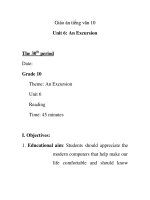UNIT 6 LANGUAGE (new Tiếng Anh 10)
Bạn đang xem bản rút gọn của tài liệu. Xem và tải ngay bản đầy đủ của tài liệu tại đây (188.79 KB, 3 trang )
H 1
LESSON OBJECTIVES
By the end of the lesson, students will be able to:
- Understand and use the lexical items related to Gender
Equality
- Use the modals and modals in passive to solve the
various exercises
- Know how to pronouce the two-syllable words with the
correct stress
6
Unit
LANGUAGE
/ 12/2014
Procedure
StudentsTeacher
War m – up (05 mins)
Re-ordering
Ask students to work in pairs and re-order the words provided into the meaningful words
Ask sts to complete on the boards
Lead-in:use th e words studetns have played to lead to the lesson
PRESENTATION (25 mins)
VOCABUARY
Present the words that studets were learnt from the last lesson and supply them with the adequate definition
Ask sts to work in pairs then match them
Ask sts to read loud turn by turn
Use a poste then ask students glue these vocabulary cards on the suitable gaps on the poster. (page 7)
AQULE DNEREG
TEIMLIAEN DIIITCRIMNAON
UTEDOCAIN UOPOYRTNPIT
H 2
Useful tips
1. Many two-syllable nouns and adjectives have stress on the first syllable.
Some exceptions: asleep, alone, hotel, guitar, mistake, machine.
2. Many two-syllable verbs have stress on the second syllable.
Some exceptions: cancel, copy, answer, enter, offer, listen, happen, open
3. Many two-syllable words having Prefix such as:
a, be, con, com, de, dis, en, for, pre, pro,
un, il, im, in, su,…
are sressed in the second syllable
4. Many two-syllable words having Suffix such as:
or, er, ist, ful, ive, ness, less, tion, sion, ic,
ics, al, ment, age, ance, ence, ant, ent, en, …
are sressed in the first syllable.
5. Many two-syllable words stress on: oo, ee, ese, ique, ette, ain, ade, …
Ask students to take note and check again the words they have done then put them in the correct table
GRAMMAR
Present the modals
Modal vers are special verbs that behave differently from other verbs. Theyare used to express ability.
Advice, duty, possibility, permission, prohibition, request or suggestion
Can/could Ability
May/might Possiblility
Should/ought to Advice/duty
Must Duty
Mustn’t/can’t Prohibition
May/will/would Request
Can/could/may Permission
Shall Suggestion
Prompt the passive voice quickly
Be + Vpp
And passive voice with Modals:
Modal + be + Vpp
Take note carefully and remember
SUPPLEMENTS:
Pronunciation: />Grammar: />H 3
Practice (13 mins)
Ask sts to do the exercise 2 and 3 on the page 8
Feedback Exercise 2
1. May be kept
2. Might be forced
3. Shouldn’t be allowed
4. Should be eliminated
Comments and Signature









